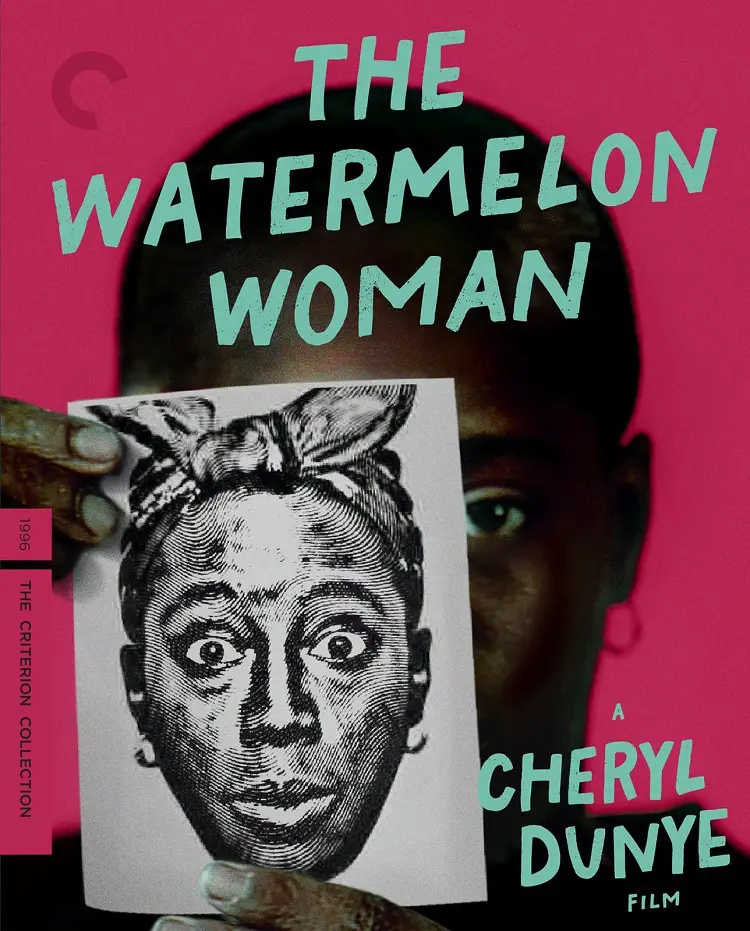
When I did my review for the original First Run Features DVD of Cheryl Dunye’s landmark 1996 lesbian classic The Watermelon Woman, I instantly found myself charmed by it. I haven’t seen it since then but even by that only viewing of the film, I think it remains one of the most intelligent, sweet, sexy, and important films ever made.
Dunye starred, wrote, and directed this honest and often funny portrait of Black queer identity, where she plays a video-store clerk (those were the days) and budding filmmaker who wants to make a documentary about forgotten Black actresses but finds herself centering on one in particular, whom she nicknames “The Watermelon Woman”. The more Cheryl investigates the more she finds that the actress’ story makes surprising connections to her own life, especially when she starts a new romance with a beautiful white customer (Geneviene Turner) at the video store.
While the film may have a formula that we’ve seen in countless other romcoms before, Duyne manages to add life and resonance to the familiar story with witty observations about dating, history, and those who have been unfortunately shunned to the sidelines. It also shows the style of a truly gifted filmmaker at the helm of it all. It’s a gem!
I was so excited when Criterion announced this as apart of this month’s lineup, and the supplements do sound nice and educational. They include a new interview with Dunye; new conversation between Dunye and artist-filmmaker Martine Syms; new conversation between Juhasz and filmmaker/film scholar Thomas Allen Harris; and six early short films by Duyne. There’s also a new essay by critic Cassie da Costa. The only thing missing is her 2014 short Black is Blue (from the original DVD), but I guess Criterion couldn’t get the rights to it. Oh well, beggars can’t be choosers.
Obviously, this is a must have for film collectors who want to watch something that is both refreshing and relevant. We rarely get films like this, and that’s too bad because they really have something potent to say about sexuality, interracial romance, friendship, and having control over one’s identity.
Other notable releases:
After Hours (Criterion) Scorsese’s criminally overlooked nightmare comedy starring Griffin Dunne as a Manhattan office worker looking to escape his mundanity by going downtown to meet a mystery woman (Rosanna Arquette). Things don’t go as he planned because a series of bizarre events pile up and try to prevent him from getting home.
Invaders from Mars (Ignite Films): A 1953 chilling sci-fi classic about a young boy (Jimmy Hunt) who witnesses a spaceship crash into a nearby sandpit. His father goes to investigate but comes back completely devoid of emotion. Finding out aliens have come to earth to use mind control on humans, he seeks help from an astronaut and a doctor to fight the extraterrestrials. [Read Greg Hammond’s review.]
Human Desire (KL Studio Classics): Glenn Ford stars in Fritz Lang 1954 film noir as a Korean War vet who returns to his job as a railroad engineer and gets quickly seduced his boss’ sultry wife (Gloria Grahame), which obviously doesn’t lead to anywhere good.
Beau is Afraid: A new Ari Aster nightmare as Joaquin Phoenix plays a mild-mannered but intense man who confronts his grimiest fears as he journeys on an epic, disturbing trek back home.
The Burning (Scream Factory): The often underrated but gruesome 1981 slasher classic about a mean camp janitor named Cropsey who is horribly burned during a prank gone very bad and returns several years later for bloody revenge, gets a new 4K upgrade.